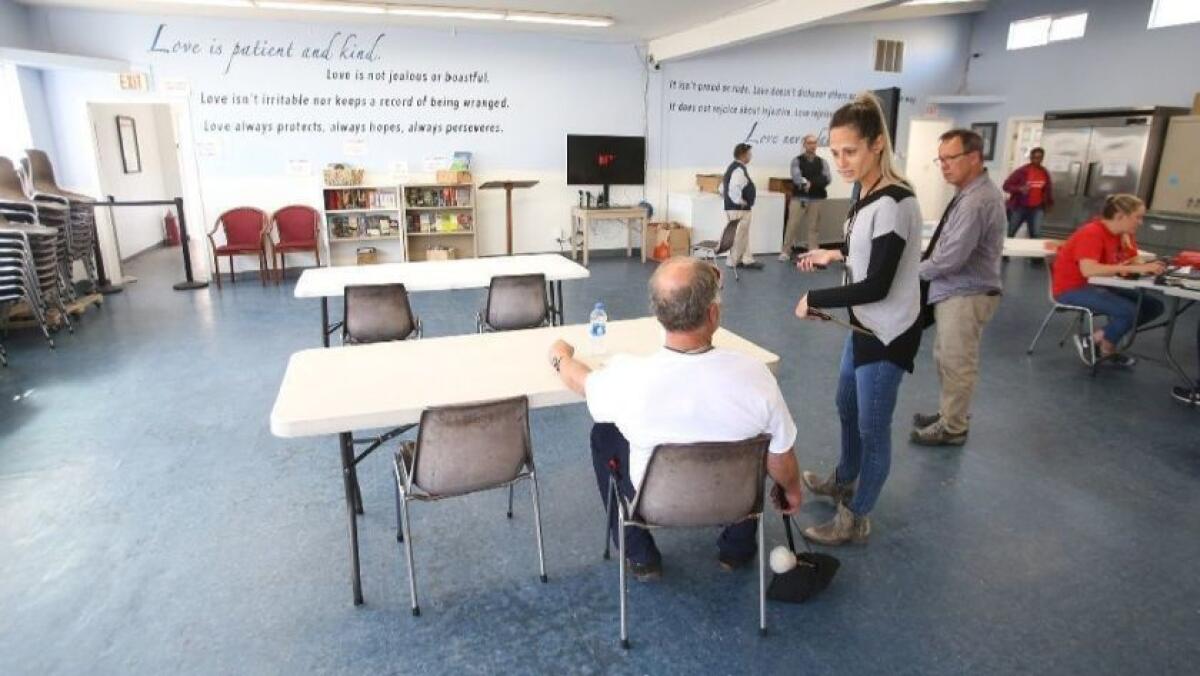Commentary: Partnerships are key in ending homelessness

- Share via
As an elected leader charged with finding solutions to homelessness, I found a recent Los Angeles Times story (“Are many homeless people in L.A. mentally ill? New findings back the public’s perception,” Oct. 7) to ring true.
As other cities grapple to find solutions, and in some cases refuse to do anything, Costa Mesa provides a model for housing success. And many of those success stories include individuals experiencing mental illness.
After nearly 20 years of watching the number of people experiencing homelessness grow and begin to encamp in our parks, on our streets and in front of our local small businesses, on April 5 Costa Mesa city leaders opened a 50-bed temporary Bridge Shelter on a portion of property at the Lighthouse Church of the Nazarene.
Of the 130-plus people who have received services at Costa Mesa’s flagship homeless shelter in the nearly six months since it opened, 18 have been placed in permanent housing throughout Orange County, according to a report the city released this week.
The city’s short-term plan to provide shelter to individuals experiencing homelessness required identifying and contracting with a site and upgrading the premises, including the addition of security fencing, adding additional street lighting and procuring modular trailer units for sleeping quarters, restrooms, showers and storage.
We also established 24-hour onsite security, as well as neighborhood management covering a half-mile patrol radius to avoid any negative impacts to nearby neighborhoods. This was all done in coordination with community members through extensive public engagement, education and outreach.
The current long-term solution to provide shelter involves a purchased permanent shelter facility in the city’s northeast industrial area near John Wayne Airport. Once that site opens in mid-2020, the Bridge Shelter at the Lighthouse will cease shelter operations. Instead the Bridge facility will operate as a shuttle stop location for client transport to and from the permanent shelter, as well as provide office space for city community outreach workers who will remain onsite and continue to conduct the shelter intake process.
The secure, reservation-only model of operation of the temporary and long-term sites prevents walk-ups and loitering around the shelter location.
This solution does not come without costs. All in, the city has invested nearly $10 million in 2019 to address homelessness. This includes the temporary Bridge Shelter implementation and operation, the permanent shelter purchase and construction, day-to-day shelter operations by Mercy House and city community outreach worker staff.
But the cost of doing nothing is far higher. According to a study by Orange County United Way, the price tag for one person experiencing homelessness is $46,000 annually when you take into account societal costs such as public safety and health care. That same study showed cities bare the brunt of those costs at $120 million a year.
The latest comprehensive census of Orange County’s homeless population found nearly 7,000 people living in shelters or on the streets countywide — a significant uptick from the last such count in 2017, according to results released Wednesday.
And our hard work is paying off as our adopted housing-first model is working. Our Point in Time count was 187 in January of this year, and we have already provided shelter to more than 135 individuals since the Bridge Shelter opened in April. Of those, we’ve already placed 25 into permanent supportive housing.
Of those clients we served, 54 (36.2%) report mental health issues, 53 (35.5%) reportedly have drug and alcohol abuse problems while 22 (14.7%) reportedly have a dual diagnosis of both mental health and substance abuse.
Our unique operational model includes city outreach social workers providing comprehensive client case management, code enforcement and police officers specially trained to work with people experiencing mental illness and addiction, as well as a partnership with a private non-profit operator’s staff from Mercy House to carry out the day-to-day shelter operations.
The reservation-only model allows Costa Mesa outreach workers to screen clients and identify their needs before a shuttle bus transports them to the shelter. The shelter includes extensive client case management and wrap-around services, including job training and placement, mental health assessments, health and dental care, substance-abuse treatment, V.A. benefits assistance, re-connections to family, connections to permanent housing and more.
Since April, more than 1,400 volunteer hours have been tallied at the Bridge Shelter, including the Carpenters Union that provided skilled workers to assist with some of the necessary site upgrades. All of this was accomplished within 40 days of City Council approval to move forward with opening the Bridge Shelter.
The improvement to the neighborhood, our local parks and small business corridors is dramatic. Now families can again enjoy the park spaces and new city library, and business owners are not forced to clean feces and trash from their storefronts each morning.
Our next phase of focus is to secure greater regional collaborations, work to access the millions in available funding at the county not being allocated to cities and to work with our community partners to find solutions to address mental illness and build permanent supportive and affordable housing. We must partner together to end homelessness.
As I said before, the solutions do come with a cost. But the cost of doing nothing is far higher.
Katrina Foley is the mayor of Costa Mesa.
How to get published: Email us at john.canalis@latimes.com. All correspondence must include full name, hometown and phone number (for verification purposes). The Pilot reserves the right to edit all submissions for clarity and length.
All the latest on Orange County from Orange County.
Get our free TimesOC newsletter.
You may occasionally receive promotional content from the Daily Pilot.






